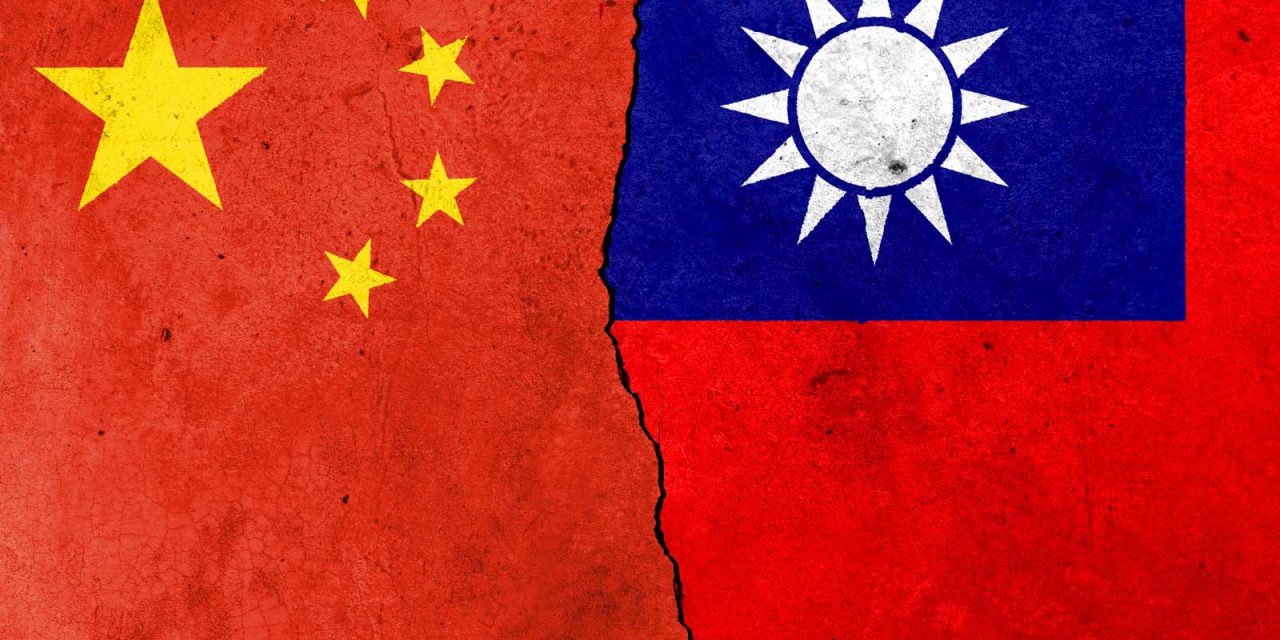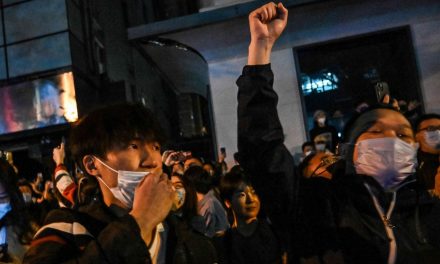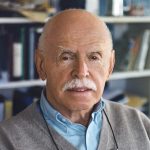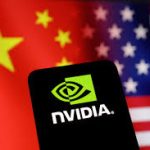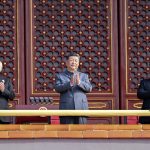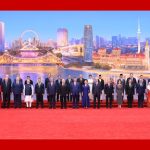By Cai Xia
Editor’s note: Cai Xia is a human-rights activist and the editor of the parent journal of this journal, Yibao (议报). For her entire life she has thought about, or been told what to think about, Taiwan. This article describes that journey. It originally appeared in Chinese on the Radio Free Asia website, at https://www.rfa.org/mandarin/pinglun/caixia/cx-05272024110334.html.
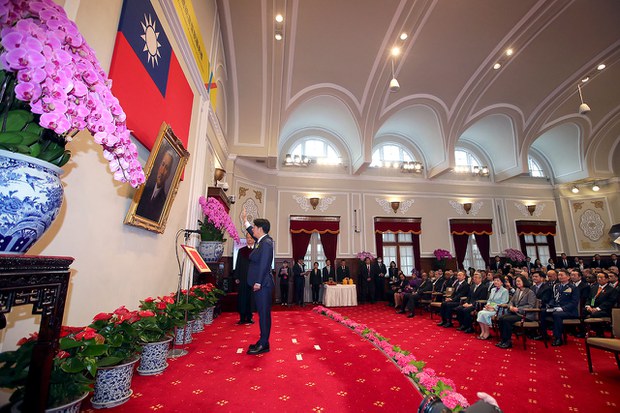
Taiwanese President Lai Ching-te at his swearing in. Photo: Associated Press
Out of nowhere, Taiwan has become deeply engraved upon my soul.
For as far back as I could remember, our country’s enemy was across the straits, on the other side of the east China Sea. That enemy was Taiwan.
My father joined the Communist guerrillas at the age of sixteen. At that time, my father’s gun was said to be pointed at the Japanese devils. But as the fight continued, it became pointed at his compatriots – the Communist Party and the Kuomintang were fighting a civil war, and all the casualties were Chinese. After the war ended, my father’s enemies ran to the other side of the sea – Taiwan. My father and his troops were stationed at the mouth of the Yangtze River. Their mission was to defend greater Shanghai and prevent Taiwan from counterattacking against the mainland. Children in the military camps who were in elementary school like me all knew that Taiwan was the enemy. Diagonally across the East China Sea, Shanghai and Taipei face each other from a distance. In the imagination, they are two enemies looking at each other with hostility from afar, with the gleam of hatred in their eyes.
When I was a child, I knew the words of Lei Feng [a Chinese folk hero, supposedly killed in an accident while doing his duty toward Mao in the early 1960s] by heart: Be as ruthless to your enemies as the cold winter! If you hate the enemy, you will naturally hate Taiwan; if you are wary of the enemy, you will be wary of anything happening in Taiwan. In order to protect greater Shanghai, my father’s army dug military tunnels and built underground military-command posts and military-communication lines. The soldiers hollowed out the five hills that were adjacent to the estuary of the Yangtze River. In the belly of the mountains was a labyrinth of military tunnels that were winding up and down, and extending in all directions, connecting the five hills. There were ammunition depots, logistics-supply warehouses, combat shelters for soldiers, and field rescue and dressing stations in the tunnels. It was easy to exit from any tunnel entrance in the five hills, or quickly reach the forward position by the river, or go straight to the highway to transfer troops. When summer came, we took small bamboo mats and small benches into the tunnel to enjoy the cool air and play around. The soldiers guarding the tunnel entrance all knew us. With a wave of their hands, the boys in the military camp rushed in, imagining they were attacking Taiwan.
After the bloody night of October 7, 2023, the Israel-Hamas war broke out. Israeli troops invaded tunnels built by Hamas in the Gaza Strip. Seeing the Hamas tunnels shown in the video, my first reaction was that they looked so familiar! The tunnels in my father’s army were also that high and wide, and also had ground tracks. Jeeps could even be driven through some of the tunnels, but they were not as modern as Hamas’s. I believe that the Chinese Engineering Corps was behind this type of tunnel construction. When I saw the Hamas tunnels in the video and thought of the tunnels my father and his troops built more than 50 years ago, I couldn’t help but feel chills running down my spine!
When I was in fifth grade, the atmosphere was very tense, in preparation for the coastal war. I heard from the teacher that Chiang Kai-shek and the Taiwanese Kuomintang were clamoring to counterattack the mainland. Sure enough, one night during the summer vacation, it was dark and windy, and my father hurried home to eat something and then went out. That night, the lights in the big window of the house in front of mine were blindingly bright. The lights in the front row attracted me. I stood in the open space outside my house and looked into the room in the front of it. I saw a large and shadowy picture on the big wall in that room. The picture was so big, but the person was so small! Father and the others were standing under the picture, and someone was holding a long pole in his hand and drawing back and forth on the big picture. That night, my father didn’t come home. Later, I heard that his superiors had received information that a small group of Taiwanese Chiang Kai-shek troops wanted to land from the Taiwanese coastal-defense force’s position. Only then did I realize that my father and the others were looking at a battle map that night and commanding the troops to fight an ambush. How the battle turned out, I don’t know.
Overall, whenever I was young and talked about Taiwan, only two words came to mind: “enemy,” and “fight.”
After reform and openness began, relations between China and Taiwan eased, and cross-straits exchanges gradually began. One afternoon in the 1980s, I went to visit my parents. There was a strange old man sitting in the living room. He looked to be in his 60s or 70s. My father was always hospitable, and my mother a good cook. Whenever my father’s comrades from other places came, my parents would always invite them to have dinner at home. That night, the meal was sumptuous but the atmosphere at the dinner table was lukewarm. My father said to me: “He is your elder, call him uncle. He fled to Taiwan in 1949, and now he comes back to visit.” My uncle was a bit reserved, and my father didn’t talk much. My mother was busy serving food. This man went to Taiwan in 1949? Did he follow Chiang Kai-shek’s army to flee to Taiwan too suddenly! My father had never said that he had such an uncle. During the war years, there were no fewer than ten elders of my family who had served in the CCP army, had some of them defected to Chiang Kai-shek’s army? My feelings suddenly became complicated and I didn’t know what to say to this man. Suddenly, I sensed that my father wasn’t talking much and my mother was busy serving the food. Maybe everything good or bad was included in the meal. In Taiwan, “Brothers are here to survive all calamities, and we can forget all the grudges with a smile when we meet.” I was stunned. I couldn’t turn the page and couldn’t explain what I was feeling.
In 1987, Chiang Ching-kuo ended the ban on political parities and on newspapers in Taiwan, even as the spring breeze of political thaw was blowing in China. I was in Suzhou at that time and from time to time heard different gossip items from Beijing. Both sides were moving toward democratic politics. The hostility between Taiwan and China might really melt away, and the two sides might no longer fight.
But history revealed me to be too naive.
In 2001, I was invited to be a guest on a program on the International Department of China Central Radio. The host invited me to talk with a professor from the National Defense University of the People’s Liberation Army about “How can we promote the reunification of the motherland?”
I replied: “Of course it is through peaceful reunification. Both sides of the Taiwan Straits are one family.” I said this because of my personal experience during the summer vacation of 2000.
On that afternoon, after I had flown from Beijing to Shanghai Hongqiao Airport, I took a minibus back to Suzhou (sort of like taking an Uber in the greater Washington area today). When we got on the bus, there were already three people sitting in the back row, a young couple and a little boy. Chinese strangers are often indifferent to each other. A nod of the head is regarded as a polite greeting. It is far different from European and American foreigners who smile and say “Hello,” and two strangers can chat over an entire trip. I stayed silent, the driver played music all the way, and the young couple sitting in the back seat discussed something intermittently in low voices. From the accent, the man was Taiwanese and the woman was from Suzhou. When we were about to enter Suzhou city, the driver asked: “Whom should I drop off first?” The man answered, “Can you go to our house first? My home is in xx New Village, xx Street. Taiwanese people have gotten married and given birth to their children here.” His request warmed my heart. “Separated only by a strip of water, as close as brothers” – it was these two traditional idioms that came to my mind at once.
After telling this little story, I said: “If the economies of both places are prosperous, it will promote more exchanges between people from the two places and promote peaceful reunification through common development. Taiwanese and mainland people will then definitely be happy.” The professor at the National Defense University did not see it that way. He said, rather, “Deng Xiaoping has said that one of the three major tasks of our party in the 1980s is to liberate Taiwan and unify the motherland, but this task is still not completed. Peaceful reunification is of course good. But at the same time, we will not give up our responsibilities as soldiers. We are always ready to complete the tasks assigned to us by the Party Central Committee.”
So the military wanted to attack Taiwan! Looking at the soldier across from me with a neat military uniform and his glistening military rank, I was numb and my hair stood on end.
A few years later, I had the opportunity to visit the classroom for a combat-simulation exercise between the red and the blue teams at the National Defense University. There was a large sand-table model at one end of the classroom. The commentator said that this represented the current situation of Taiwan’s military facilities and troop deployment. Obviously, the combat position for the confrontation between the Red Army and the Blue Army was in Taiwan, and Taiwan was the imaginary enemy. The sandbox model was very realistic and everything was labeled clearly. I asked the teacher from the National Defense University who accompanied me on the tour, “If you have such a thorough understanding of Taiwan, then the Taiwan military also knows our side very well, right?” The teacher from the National Defense University hesitated and said, “It’s very possible. Nowadays, technology is greatly advanced. Anyone on either side will know if the other makes any moves.” After visiting the sand table and the simulated confrontation, we listened to an internal report from an intelligence officer who had recently returned from Taiwan. He said that his public identity was that of an overseas Chinese businessman. This intelligence officer had been undercover in Taiwan for 6 years, and his mission was to find out information that could not be obtained by remote technical- reconnaissance methods. This visit left a very deep impression on me. It seemed that the central government’s military preparations for attacking Taiwan had not slackened for a day. At that time, I had a flash of doubt: the official cross-strait “three links” had been established, and there were already intermarriages between residents of the two places. Going to Taiwan and looking for a Taiwanese wife was no longer unusual in Shanghai, Suzhou, Kunshan and other places where Taiwanese businessmen lived. Why did the People’s Liberation Army still want to emphasize fighting? I was puzzled.
I had mistakenly thought that the top leaders of the Chinese Communist Party would also promote political reforms like Chiang Ching-kuo did. I was wrong. In the autumn of 2008, I went to Spain. After returning to Beijing, I tried to compare several major factors in Spain’s peaceful political transformation with Communist China. I felt crestfallen. For the first time, I clearly realized that it is absolutely impossible for the Chinese Communist Party to lead the country toward democratic politics. The CCP regards power as its lifeblood. As long as any political reform might threaten that power, no matter what it is, the CCP will ruthlessly destroy it. During Mao Zedong’s rule, he emphasized being wary of “Khrushchev sleeping beside you”; after the drastic changes in the former Soviet Union and Eastern European countries, no one at the top wanted to be “the Gorbachev of the Chinese Communist Party.” When Xi Jinping came to power in 2012, China’s political regression accelerated, shattering my last remaining illusions.
Before this time, scholars from the Chinese Academy of Social Sciences had guided me out of the institutional walls and introduced me to scholars in universities and private think tanks. They allowed me to enter a vast academic world and gave me the opportunity to meet Hsu Szu-chien, a political scientist in Taiwanese academic circles. Later, Mr. Hsu served as President Tsai Ing-wen’s Undersecretary of Foreign Affairs (Deputy Minister), and now he is the Deputy Secretary-General of Taiwan’s National Security Council. At that time, academic exchanges between China and Taiwan were still normal, and we met every year at conferences. I knew that Hsu Szu-chien’s father was a top official of the Kuomintang, and I asked him during a chat: “Your father is in the KMT, why don’t you like that party?” He responded, “Because they are corrupt.” I laughed: “Ha, the descendants of the Kuomintang are anti-Kuomintang, The descendants of the Communist Party are anti-Communist. There are children on both sides who in the back of their minds are renegades!” He also laughed. At that time, I felt moved in my heart. I really felt like I was “responding with the same voice, praying for each other with the same spirit,” and was greatly encouraged. Among the descendants of the Kuomintang and the Communist Party, those who sincerely pursued national progress transcended party affiliation.
In 2014, friends and I went to Taiwan in an organized group. Taiwanese entrepreneurs designed an inspection itinerary for us on Taiwan’s economy, politics, and culture. We went to the residence of the free-market economist Mr. Zhou Dewei, born in Changsha but who ended up in Taiwan. The residence was in Wisteria House, and had once been a gathering place for liberal intellectuals in Taiwan. We also went to the former residence of Yin Haiguang, originally from Hubei. The house is very simple, and the thoughts left by the owner Mr. Yin have inspired several generations of Chinese people. We also went to Green Island. Green Island Prison had held political prisoners who were detained, including political dissidents, during Chiang Kai-shek’s martial-law period. When you enter the prison gate, you are faced with a large wall, on which are the names of the victims and imprisoned political prisoners. Walking into the small and crude cells and looking at the various torture instruments displayed in the pictures, you see evidence of Chiang Kai-shek’s harsh rule during the martial-law period, which was like a foreshadowing of Xi Jinping’s tyranny.
After Xi Jinping came to power, he began the most brutal and darkest period in Chinese politics since the death of Mao Zedong. In 2014, the famous journalist Gao Yu was imprisoned again by the Xi Jinping authorities on trumped-up charges. In 2015, the “July 9” mass arrests occurred, with 23 Provincial and municipal police arresting more than 280 human-rights lawyers at the same time. Then came the three-year epidemic, when all kinds of practices against humanity and civilization made the land of China resound with cries of helplessness and despair. There are no real figures for how many people have died in China in the past three years. Historical revelations after the fall of the CCP may inform people that the death toll from the three-year epidemic in China is comparable to that from the three-year famine during the Mao Zedong period.
On our Taiwanese trip, during more than ten days of exploration, we shared and experienced the free, democratic, peaceful and prosperous life of the Taiwanese people, and at the same time reviewed and thought about the difficulties and revelations of Taiwan’s political transformation. Emotional changes are real changes in people’s hearts. My trip to Taiwan brought me very close to that land. In my heart, Taiwan is a beacon of hope, giving great encouragement and strength to Chinese people like me. What the Taiwanese can do, the Chinese can do sooner or later.
May 20, 2024 was a big day for the Taiwanese people, and also a big day in my heart. Across the Pacific Ocean, starting from around 8 o’clock on the night of May 19 in the eastern United States, I watched the entire inauguration ceremony of President Lai Ching-te and Vice President Hsiao Bi-Khim on YouTube, and listened to President Lai Ching-te’s inaugural speech twice. Taiwan is not China’s Taiwan, it is the world’s Taiwan! Taiwan’s prosperity is the world’s prosperity, and Taiwan’s progress is the world’s progress!
Congratulations to President Lai Ching-te and Vice President Hsiao Bi-Khim!
And best wishes to the people of Taiwan!

